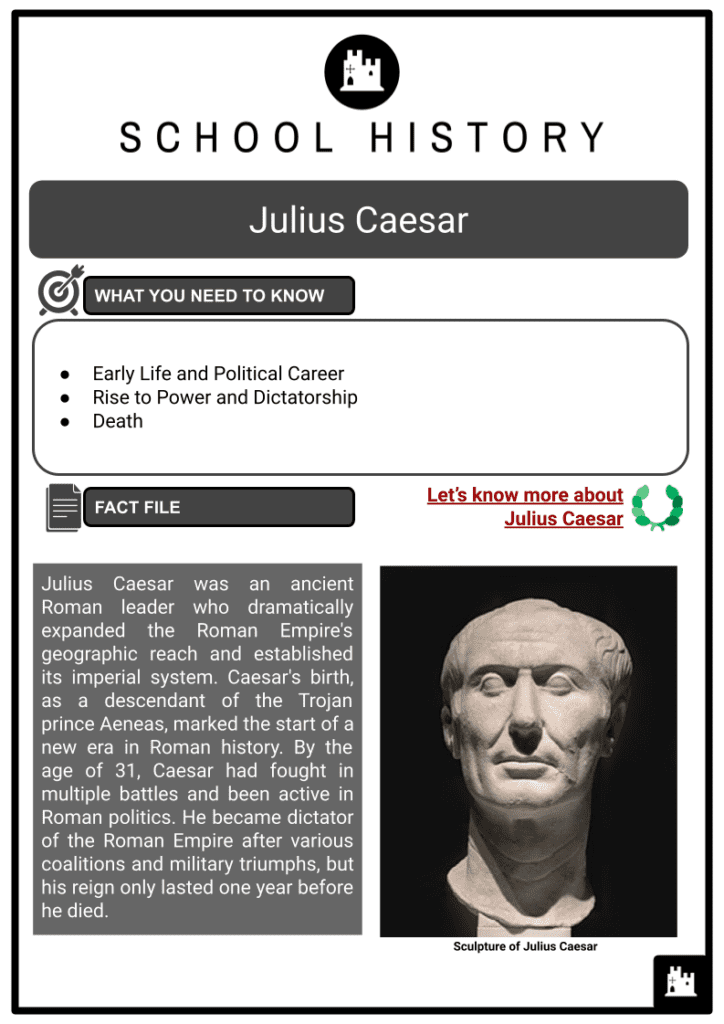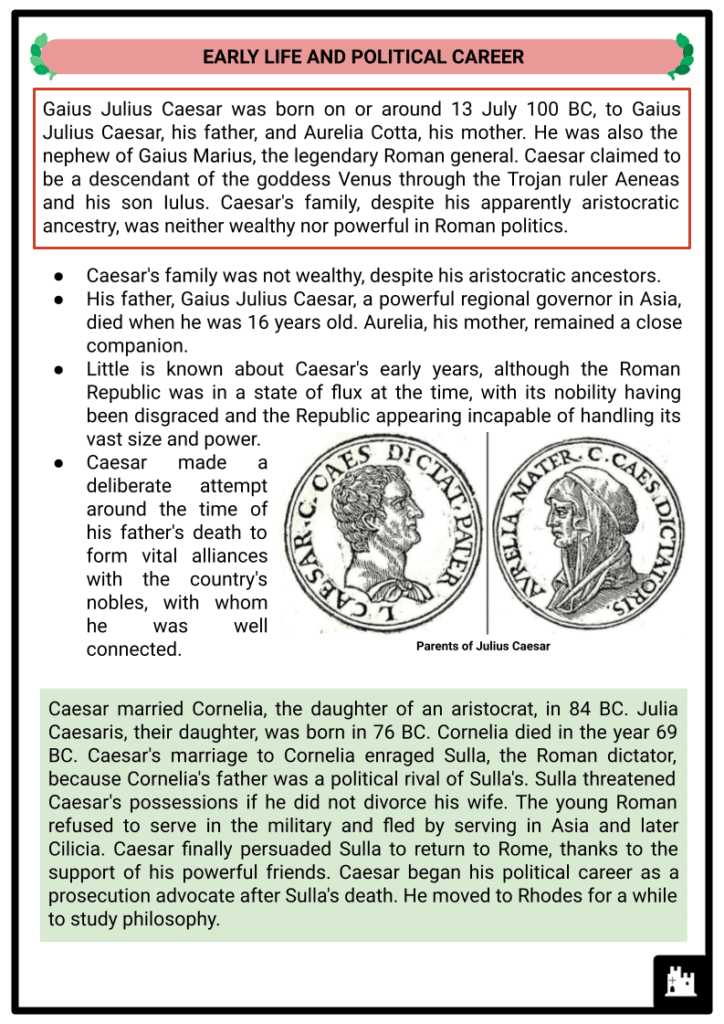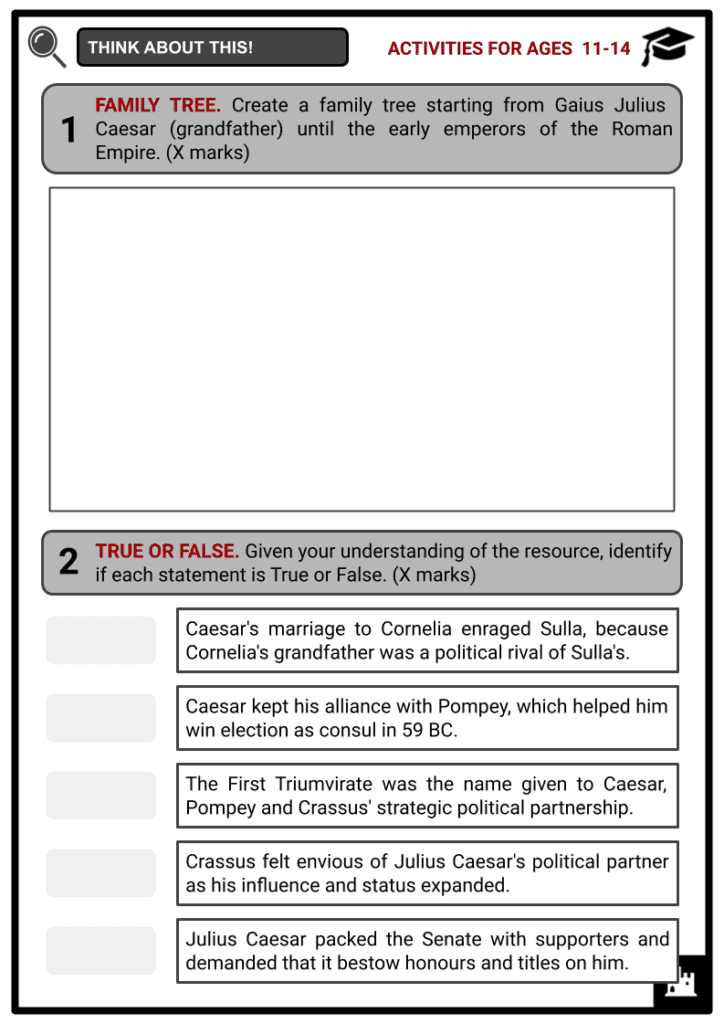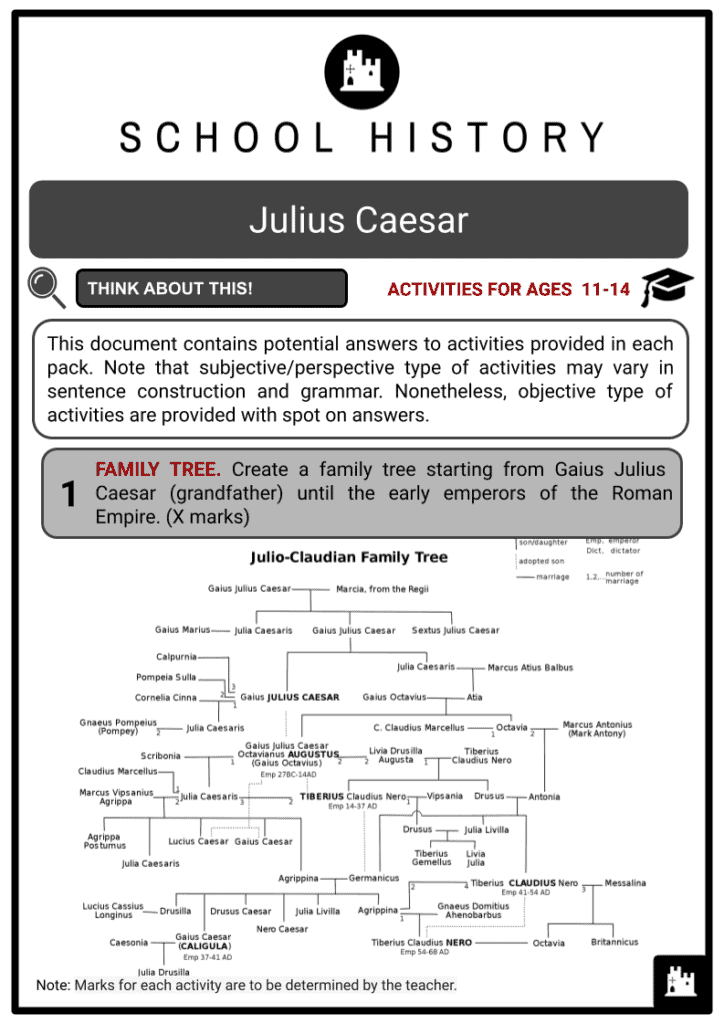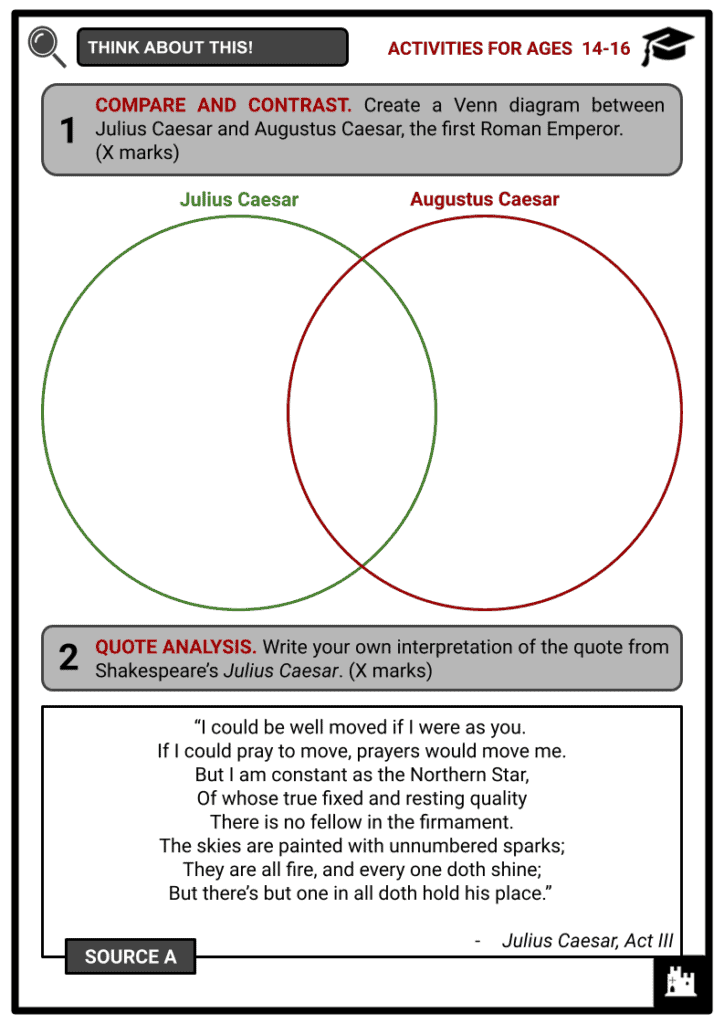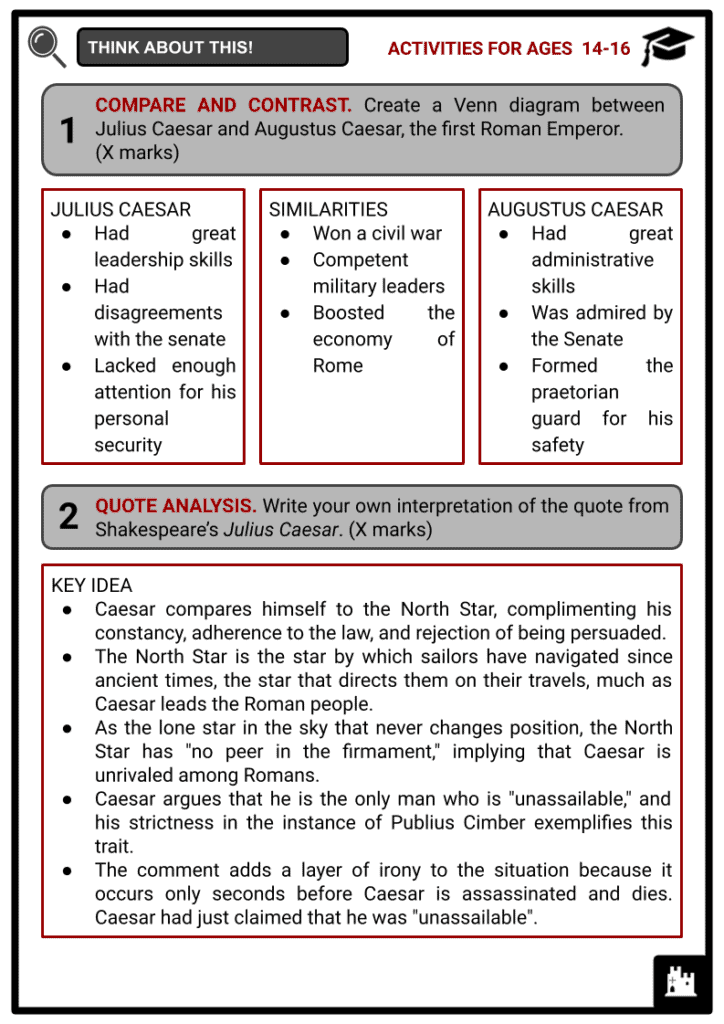Julius Caesar Worksheets
Do you want to save dozens of hours in time? Get your evenings and weekends back? Be able to teach about Julius Caesar to your students?
Our worksheet bundle includes a fact file and printable worksheets and student activities. Perfect for both the classroom and homeschooling!
Summary
- Early Life and Political Career
- Rise to Power and Dictatorship
- Death
Key Facts And Information
Let’s find out more about Julius Caesar!
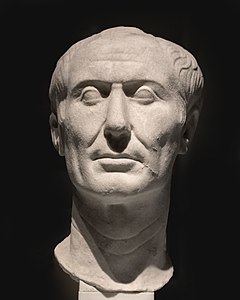
Julius Caesar was an ancient Roman leader who dramatically expanded the Roman Empire's geographic reach and established its imperial system. Caesar's birth, as a descendant of the Trojan prince Aeneas, marked the start of a new era in Roman history. By the age of 31, Caesar had fought in multiple battles and been active in Roman politics. He became dictator of the Roman Empire after various coalitions and military triumphs, but his reign only lasted one year before he died.
EARLY LIFE AND POLITICAL CAREER
- Gaius Julius Caesar was born on or around 13 July 100 BC, to Gaius Julius Caesar, his father, and Aurelia Cotta, his mother. He was also the nephew of Gaius Marius, the legendary Roman general. Caesar claimed to be a descendant of the goddess Venus through the Trojan ruler Aeneas and his son Iulus. Caesar's family, despite his apparently aristocratic ancestry, was neither wealthy nor powerful in Roman politics.
- Caesar's family was not wealthy, despite his aristocratic ancestors.
- His father, Gaius Julius Caesar, a powerful regional governor in Asia, died when he was 16 years old. Aurelia, his mother, remained a close companion.
- Little is known about Caesar's early years, although the Roman Republic was in a state of flux at the time, with its nobility having been disgraced and the Republic appearing incapable of handling its vast size and power.
- Caesar made a deliberate attempt around the time of his father's death to form vital alliances with the country's nobles, with whom he was well connected.
- Caesar married Cornelia, the daughter of an aristocrat, in 84 BC. Julia Caesaris, their daughter, was born in 76 BC. Cornelia died in the year 69 BC. Caesar's marriage to Cornelia enraged Sulla, the Roman dictator, because Cornelia's father was a political rival of Sulla's. Sulla threatened Caesar's possessions if he did not divorce his wife. The young Roman refused to serve in the military and fled by serving in Asia and later Cilicia. Caesar finally persuaded Sulla to return to Rome, thanks to the support of his powerful friends. Caesar began his political career as a prosecution advocate after Sulla's death. He moved to Rhodes for a while to study philosophy.
- Pirates abducted him as he was on his way. He encouraged his kidnappers to raise his ransom, then gathered a naval force to assault them in a daring demonstration of his negotiation skills and counter-insurgency techniques. The pirates were apprehended and put to death. In 74 BC, Caesar's status was considerably boosted. When he formed a private army and went up against Mithradates VI Eupator, King of Pontus, who had declared war on Rome, he was a hero.
- Gnaeus Pompey Magnus, a formidable military and political leader, formed an alliance with Caesar. Shortly after, he was chosen as quaestor (a minor political office) in 68 or 69 BC. Caesar went on to hold a number of important government roles.
- Caesar married Pompeia, Sulla's granddaughter, in 67 BC. Their marriage lasted only a few years, and they divorced around 62 BC. Caesar was governor of the Roman province of Spain from 61 to 60 BC. Caesar kept his relationship with Pompey, which helped him win election as consul, a key government position, in 59 BC. Caesar married Calpurnia, a teenager, the same year and stayed married to her for the remainder of his life. (Among his mistresses was Cleopatra VII, Queen of Egypt, with whom he had a son, Caesarion.)
- At the same time that Caesar was reigning under Pompey, he formed an alliance with Marcus Licinius Crassus, a rich military leader. The First Triumvirate was the name given to Caesar, Pompey and Crassus' strategic political partnership.
- The First Triumvirate collaboration was the ideal staging ground for Caesar's rise to power. Crassus, the richest man in Roman history, provided Caesar with financial and political assistance that was crucial to his ascent to power.
- Crassus and Pompey, on the other hand, were bitter rivals. Caesar demonstrated his negotiating skills once more, winning the trust of both Crassus and Pompey and convincing them that they would be better off as partners than enemies.
RISE TO POWER AND DICTATORSHIP
- He was also keeping an eye on the political situation in Rome, employing crucial political operatives to work on his behalf. Pompey felt envious of Julius Caesar's political partner as his influence and status expanded. Meanwhile, Crassus' dislike for Pompey had never totally vanished.
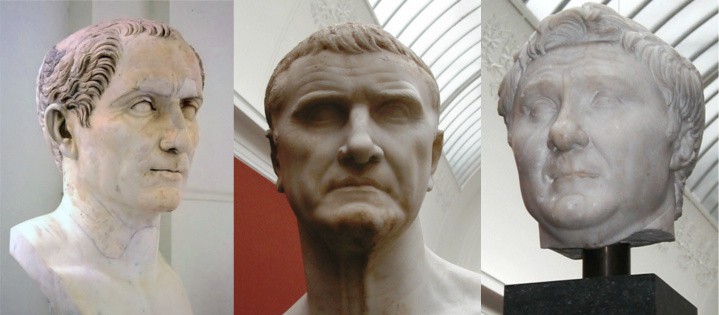
First Triumvirate (Caesar, Crassus, Pompey) - In 56 BCE, the three leaders patched things up momentarily. Caesar's existing territorial power was extended for another five years during a meeting at Luca, which also gave Crassus a five-year term in Syria and Pompey a five-year term in Spain.
- However, Crassus was slain in a battle in Syria three years later. At about this time, Pompey, who had reignited his doubts about Caesar's ascent, ordered Caesar to dissolve his army and return to Rome as a private citizen.
- By late 48 BCE, Caesar had defeated Pompey and his followers in Italy, Spain and Greece, eventually pursuing Pompey into Egypt. Pompey was slain as soon as he stepped ashore in Egypt, despite the Egyptians' knowledge of Pompey's losses and their belief that the gods backed Caesar. Caesar claimed to be enraged at Pompey's assassination. Caesar visited with Cleopatra, the Egyptian queen, after putting his assassins to death.
- Caesar and Cleopatra formed an alliance (and an intimate connection) that saw Ptolemy XIII, her brother and co-regent, overthrown and Cleopatra crowned as Egyptian queen. She and her son by Caesar, Caesarion, were adept political tacticians who played a key role in international events for years, culminating in her relationship with Roman commander Mark Antony.
- Caesar was honoured as the father of his country and appointed dictator for life upon his triumphant return to Rome. Despite the fact that Caesar's reign was brief, his authority was crucial in improving Rome for the sake of his citizens. Caesar reformed the Senate by expanding its size and opening it up to better represent all Romans, freeing the empire of debt and reforming the Senate. He changed the Roman calendar and reorganised the local government's structure.
- Caesar also rebuilt Carthage and Corinth, two city-states that had been devastated by his predecessors. He also granted citizenship to some foreigners. Caesar, a kind victor, even allowed several of his vanquished opponents to join him in administration. At the same time, Caesar was keen to maintain his power and authority. He packed the Senate with supporters and demanded that it bestow honours and titles on him. At assembly sessions, he was the first to speak, and Roman coins carried his image.
DEATH OF JULIUS CAESAR
- While Caesar's reforms improved his status among Rome's lower and middle classes, his growing influence in the Roman Senate was received with jealousy, worry and anguish. Caesar was viewed by certain politicians as a potential ruler. And the Romans had no desire for monarchical control: it had been five centuries since they had permitted a king to rule them, according to legend. Caesar's decision to appoint former Roman opponents to his cabinet contributed to his demise.
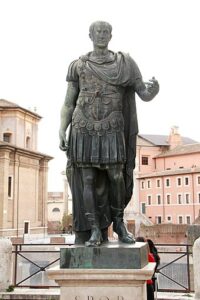
Statue of Caesar in Rome - On the Ides of 15 March 44 BCE, Caesar was slain by political enemies. Caesar may or may not have been aware of the assassination plot: according to all accounts, he planned to depart Rome on 18 March for a military campaign in what is now modern-day Iraq, where he wanted to revenge the losses incurred by his erstwhile political partner Crassus.
- Caesar's assassination was planned by Gaius Cassius Longinus and Marcus Junius Brutus, longtime enemies of Caesar who had joined the Roman Senate. 'The liberators', Cassius and Brutus dubbed themselves.
- The involvement of Brutus in the murder has the most complicated history. He had first supported Caesar's opponent, Pompey, during Rome's previous civil war. Brutus was persuaded to join Caesar's administration after Caesar's triumph over Pompey. Servilia, his mother, was also one of Caesar's lovers.
- Caesar was swiftly made a martyr in the fledgling Roman Empire after his death. At Caesar's burial, a mob of lower- and middle-class Romans assembled, and the enraged throng attacked Cassius and Brutus' homes. Caesar was the first Roman figure to be deified only two years after his death. The Senate also bestowed the title 'Divine Julius' upon him.
- In Rome, a power struggle erupted, resulting in the Roman Republic's demise. Gaius Octavian, Caesar's great-grandnephew, capitalised on his uncle's popularity by gathering an army to beat off the armed forces backing Cassius and Brutus. In 27 BCE, Octavian, who took the name Augustus, defeated Caesar's murderers and gained power, ascending to the position of Roman Emperor.

